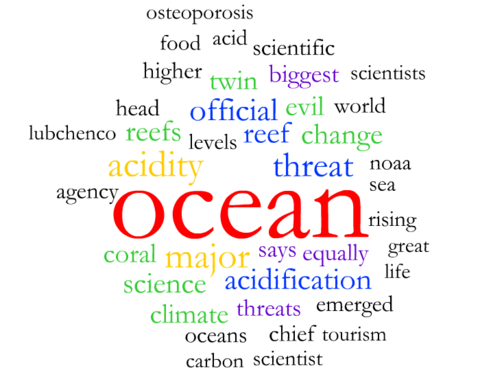How To: Talk About Ocean Acidification in Public
This post is part of the Attention Toolkit: Ocean Acidification

^ How are people talking about OA online these days? The wordcloud above was generated by our resident internet trawler-in-chief using cutting-edge tools so expensive they have their own car service.
Ocean acidification... just rolls right off the tongue, doesn’t it? We’ve perused the latest in OA opinion research to bring you some tips on how to communicate OA to regular humans.
Without further ado:
The role of the living ocean is not well understood, so first lay the groundwork.
The first step is to remind people of the functions of the ocean. The second is to introduce them to ocean acidification with a simple, “just the facts” definition of what ocean acidification is.
Use pictures, analogies and local stories to establish the problem.
Introduce real live people, and their stories, to humanize and localize the issue. Stress that ocean acidification is happening now (not just in the future), and that is has measurable impacts. Bonus points if you can point to local impacts that affect your readers/audience personally.
For example:
The oyster industry in Oregon and Washington is worth $110 million a year and employs 3,200 people; if oysters are no longer able to form shells, that industry and those employees are affected.
The federal government is saying go ahead and drill off our coast,” said shellfish harvester Kevin Rhodes. “Ultimately, that’ll mean more emissions that will hurt us down the line. We can find another way to make energy. We can’t find another way to make fish.”
Remember that science is perceived as the credible voice on this issue.
Showcase the science, and scientists, but don’t go too far into the seaweeds. You can always link to another website or source for those who are interested.
Activate your audience.
Whether folks are hearing about ocean acidification for the first time or are old hats, the scale and global nature of the problem can feel really overwhelming. Provide an outlet for their emotions that gives them an opportunity for agency rather than despondency.
Say this:
✔ “oceans are the lungs of the planet”
✔ “ocean acidification is the osteoporosis of the ocean”
✔ “ocean acidiciation is changing the ocean’s chemistry”
Rather than this:
X “ocean acidification is the evil twin of climate change” [catchy but may come off as flippant]
X the words “cycles” and “resilience” (in the ocean science sense -- people think the ocean is so big it can always bounce back)
More in the Attention Toolkit: Ocean Acidification
Add a comment